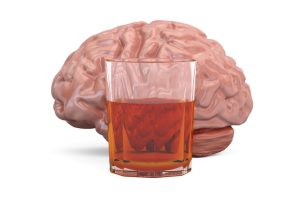Alcohol consumption is common in our culture, with nearly 33% of the United States population drinking at least one beverage daily. In addition, with high-intensity binge drinking becoming an emerging trend, it’s important to gain an understanding of the brain effects of alcohol.

While moderate amounts of alcohol consumed responsibly isn’t likely to be detrimental, there’s no denying its interference with brain pathways, especially when consumed in large quantities.
As a result of alcohol consumption, several health consequences may develop, some of which impact the brain and its chemistry.
In what follows, we’ll be discussing the physiological effects of alcohol on the brain. Further, we’ll touch on alcoholism, how it develops, and its corresponding consequences. Finally, we’ll discuss the origins of alcohol-related brain damage.
Alcohol and Its Effects on the Brain
Ethanol is a colorless, odorless liquid produced from fermented grain mash. Ethanol is also known as ethyl alcohol or simply alcohol. Ethanol production involves two steps: fermentation and distillation. The fermentation process involves yeast converting sugars found in grains such as corn, wheat, barley, rye, oats, millet, rice, sorghum, and teff into a fermented mixture. Afterward, the fermented mixture undergoes distillation, in which the alcohol vaporizes during a heating process, leaving behind only pure ethanol.
There are multiple effects of alcohol on the brain ranging from short-term symptoms to long-term side effects, and these effects are ultimately defined by the quantity of alcohol consumed.
Some short-term effects of alcohol on the brain include impaired judgment, difficulty focusing, slurred speech, and poor coordination. Other short-term consequences include gaps in memory, headaches, changes in mood, and even a loss of consciousness.
Long-term effects are much more detrimental, and these are seen in those with excessive drinking habits.
While some studies suggest that a moderate amount of alcohol can be beneficial, improving mood and emotional well-being, other studies suggest that just one drink daily can increase the risk of brain-related conditions such as dementia.
The more alcohol that’s consumed, the greater the consequences on the brain. Heavy drinkers are at much higher risk of early onset memory loss and other cognitive-related impairments. In addition, heavy drinkers develop brain deterioration to the point that these individuals have a higher risk of brain complications that could lead to death. These complications result from the condition of alcohol-related neurodegeneration.
The effects, however, are wide-ranging and include additional short-term and long-term effects, such as depression and mania.
Alcohol abuse increases the risk of other health-related consequences, such as strokes and heart attacks. The cumulation of all of these health effects can be premature death.

Alcohol-Related Brain Damage
Primarily defined by damage to the hippocampus, alcohol-related brain damage is associated with memory loss, difficulty learning, lack of coordination and stability, attention deficit disorder, emotional instability and temperament, and mental health issues, such as depression.
Other areas of the brain commonly damaged due to excessive alcohol consumption include the cerebellum, cerebral cortex, and hypothalamus. These brain areas are responsible for learning, coordination, hormonal release, and control of emotions.
Depending on the severity of brain damage, these effects can be long-lasting or even permanent in some cases.
While alcohol-related brain damage can possibly occur from moderate consumption, especially in the case of teenage or adolescent age drinkers, it is most commonly seen in long-term abusers of alcohol for many years.
As a result of such brain damage, alcohol-induced mental health conditions can develop and persist. Examples of mental illnesses that can develop include bipolar disorder, psychotic disorder, anxiety disorder, and chronic depressive disorder.
Managing Alcohol Consumption
In order to limit the extent of brain damage or other health disorders that can be seen with alcohol abuse, a reduction or elimination altogether of alcohol is required. This process can be quite a difficult task depending on the level of alcoholism involved.
In milder cases, personal discretion can be used to monitor and maintain a healthy balance of alcohol intake. In severe cases of alcoholism, professional interventions are required. Individuals with advanced alcoholism may require medical detoxification to eliminate alcohol consumption safely. These individuals can be at risk of severe withdrawal symptoms, including seizure activity. So, it is quite important that seeking professional medical advice is the safest way to proceed with alcohol abuse treatment. The treatment should also include programs such as Alcoholics Anonymous or SMART Recovery.

Through personal interventions, support groups, professional therapy, and medical treatment, alcohol consumption can be successfully managed, and brain health improved.
Similarly, mental health conditions caused by alcohol abuse can be treated and managed with the necessary interventions.
Final Thoughts
Whether in moderate amounts or excessive amounts, alcohol impacts the brain and changes its chemistry significantly. Although it may not be necessary for individuals who drink responsibly to eliminate alcohol completely, it is recommended to monitor consumption closely.
The consequences of alcohol consumption on the brain, particularly when consumed in heavy amounts, can be severe. Those who find themselves spiralling through the addiction of alcohol should seek the available resources of professional medical help and decrease their risk of poor brain health.
